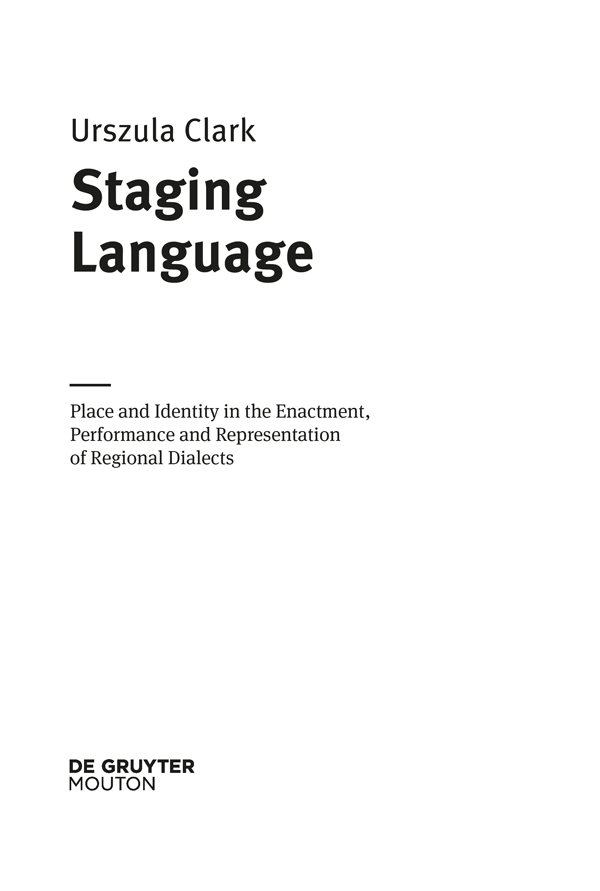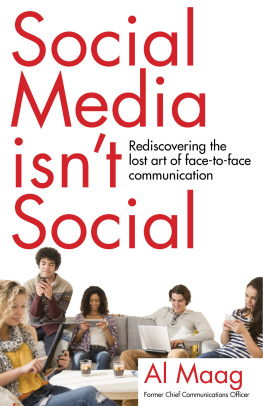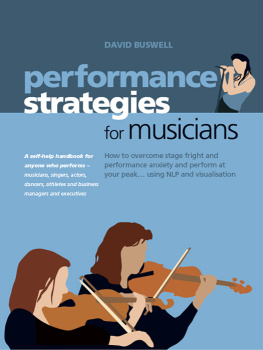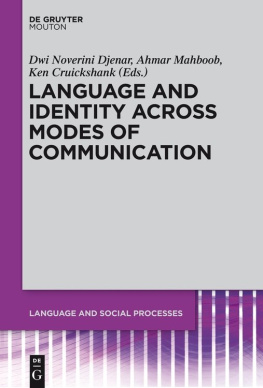Contents
Guide

Urszula Clark
Staging Language
Language and Social Life

Editors
David Britain
Crispin Thurlow
Volume 13

ISBN 978-1-5015-1541-5
e-ISBN (PDF) 978-1-5015-0679-6
e-ISBN (EPUB) 978-1-5015-0669-7
ISSN 2192-2128
Library of Congress Control Number: 2018959331
Bibliographic information published by the Deutsche Nationalbibliothek
The Deutsche Nationalbibliothek lists this publication in the Deutsche Nationalbibliografie; detailed bibliographic data are available on the Internet at http://dnb.dnb.de.
2019 Walter de Gruyter, Inc., Boston/Berlin
www.degruyter.com
Acknowledgements
There are many people to whom I am indebted in assisting me in the realization of this volume. First of all, I wish to thank two UK research grant awarding bodies, the Leverhulme Trust who awarding me a Leverhulme Research Fellowship and the Economic and Social Sciences Research Council (ESRC), including the anonymous reviewers, for awarding me a further two grants. Thanks are also due to the performers and all the other people who participated in the project, and to all the research assistance I received over the years. Many warm thanks to the series editors and the anonymous reviewer of the initial proposal, without whose support this volume would not have seen the light of day. I wish to thank Lara Wysong and the editorial team at De Gruyter. And last but not least, thanks are due to my colleagues, family and friends for their support and understanding throughout the whole process.
1Staging language: Place and identity in the enactment, performance and representation of regional dialects
1.1Introduction
My overall aim in this book is to investigate the relationship between a specific discursive practice that of creative and imaginative performance played face to face by local performers in front of a local audience and any connections such performance may have with language and identity linked to place. In line with recent research (Trester 2012; Jaffe 2015; Jaffe et al. 2015; Vigourouz 2015 among others) largely undertaken in relation to languages other than English, I investigate the role of dialect use in English in creating and maintaining specific cultural, social and regional identities in the context of contemporary, localised, live spoken word events performed by regionally based performers and attended by local audiences. In so doing, I also consider issues related to creativity and imagination, by taking account of the degree to which dialect use is incorporated in tune with the locality in which performances take place, together with the wider cultural, historical and socio-political contexts within which they are performed. Such considerations allow for an examination of the beliefs, values, assumptions and ideologies that underpin the performance contexts and dialect use therein, and the nature of the dialectic relationship between linguistic form and function, linguistic ideology and interactional practice.
The lens through which dialect use is viewed in this book then, is not so much concerned with either a comprehensive linguistic analysis of identified dialect features or a discussion of perceived attitudes and beliefs in relation to social and regional dialects of English. Rather, I am concerned more with how performers in a specific region of England, in this instance that of the West Midlands, engage creatively and imaginatively with dialect features in their performances. Firstly, in relation to the ways in which social identities linked to place are constructed and secondly, how such identities align with social class and power structures in contemporary society. Following Eckert (2000), Coupland (2007) Johnstone (2011) amongst others, such consideration is set against the background of the wider historical and socio-political contexts within which language is used and the sets of beliefs, values, assumptions or ideologies that underpin these contexts.
Identification of dialect features then, rather than being an end in itself, acts as a catalyst for examining their role in the discourse within which it takes place. Auer (2013) has made the point that in traditional dialectology, the focus demonstrates. An interactional perspective upon dialect use also entails conceiving of alternatives in language not as variants of underlying abstract (or more basic) structural units that are distributed in a contextually determined versus free form fashion, but rather as resources in their own right. (Couper-Kuhlan and Selting 2018: 548).
Equally, a corresponding consideration of the social forces governing or underpinning any individuals spoken language use has also largely been ignored. It is also often assumed that speakers who draw upon regional accent and dialect in their speech will do so in relation to one dialect and its corresponding accent. For example, in the performance context, a performer born and brought up in the English city of Birmingham to indigenous white parents of a low socioeconomic class but who has, by virtue of education and/or employment become in adult life a member of a higher socio-economic class, may speak standard English with a Birmingham (Brummie) accent. S/he may also, though, enregister specific features of that accent to index Birmingham, known locally as Brum and being Brummie. Locally based performers and in urban areas particularly, may also draw upon a range of accents and dialects from different places both within England and beyond in crafting their personae in their performances. This is evident in , where I discuss performers of Jamaican heritage from the Jamaican community within Birmingham who draw upon Jamaican Creole, Patwa and Brummie in their performances. In this way, performers draw upon what Auer (2011) in the context of mainland European languages has called a linguistic pool and Cheshire et al. (2011) a feature pool , whereby a range of accent and dialect features are used to index different aspects of identities individual, local, regional, national and global. Such performers may be said to create a new multiethnolect (Clyne 2000) discussed further in that chapter.
My focus also includes examining the ways overt stylization in creative performance sheds light on the multiple social indexes being performed by any performer(s) through a multiplicity of voices; the ways in which audiences react to them and how performers draw upon dialect to challenge hegemonic practices associated with standard English. The face to face performance contexts of the kind I discuss in this book, can be seen as a kind of in-between zone between casual face to face conversation and the type of heavily scripted language of most traditional spoken media. Live performance is particularly interesting in terms of the relationship between performers and their audiences. This is because live performance is interactive in nature, ranging from close proximity between any one performer or performers and their audiences in small venues such as rooms in public houses to the distance created between a stage and auditorium in a theatre, amateur or professional. In such settings, and particularly in relation to semi-improvised performance such as comedy, feedback flows from the audience to performer who, in turn, may make adjustments in to what they say response. Discussion of performances therefore, is accompanied by a consideration of what performers in the case of comedy and sketches, playwrights in the case of scripted plays, and members of their audiences have to say about specific performances, and particularly in relation to the reflexivity and metapragmatic awareness (or lack of) involved in preparing and enacting a performance. These conversation interviews provide a behind the scenes view of linguistic performance scenarios. They offer insight into the extent to which performers deliberately draw upon certain features of dialect as a resource in not only creating characters and scenarios but also with the iterative dynamic between performances, audiences and the places and spaces within which performances are enacted. Whilst the extent to which individuals do this in the course of day to day interaction has been the focus of much recent sociolinguistic research, my focus is upon the ways performers draw upon dialect use in their staged performances to create and maintain difference from standard English. Particularly, this focus is upon the ways such use can be said to juxtapose the norms and values of those within a given community with those outside it, thereby subverting traditional notions of linguistic and thereby social hierarchy. Consequently, I examine how such overt stylization sheds light on the multiple social indexes being performed by any individual performer through a multiplicity of voices. In so doing, I also address issues of reception in considering the reaction of audience members to performances and performers.









